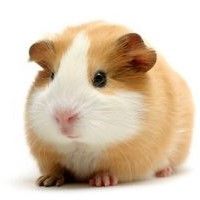SMALL PETS
Guinea Pigs
The Guinea pig is a sociable and wonderful chatty little pet. It is a very vocal animal with several different sounds.
Food pellets are available for guinea pigs, but their diet should be supplemented with fresh fruit, hay and water.
Make sure that fresh food is changed daily and kept separate from the pellets. It will also appreciate chewing toys like all rodents do.
Signs of illness can include runny nose and eyes, excessive salivating, diarrhoea, skin disease and loss of appetite, they are also prone to shock and dehydration.
With proper care and attention, your guinea pig can live for up to 10 happy years and sometimes longer. 4 – 5 years is typical though for a domestic guinea pig.
As they are so gregarious, they do get lonely and it is best to keep at least 2 together, but beware the speed with which a mixed pair will breed. If you do want to breed, the sow must be between 5 and 9 months before she has her first litter. You can keep any number of females together.
Males or boars are best kept in pairs – if a younger male is introduced to an older one, he must have a tube or pipe he can hide in initially to hide from his bigger new hutch mate.
Do not keep guinea pigs and rabbits together if they have not already been used to each other from a very young age. Rabbits have strong back legs and uncontrollable urges in uncastrated males to mate. This may lead to sometimes potentially fatal wounds in your guinea pig.
Ensure that the hutch they live in is large enough for your guinea pig to stand on its hindlegs without its head touching the roof. Outdoor hutches should have a sloping roof with an overhang to protect it from bad weather and covered with roofing felt to prevent it leaking. It should be away from draughts and direct sunlight.
It should be raised off the ground and have mesh with holes that are very small to prevent mice from entering. This happens commonly as mice are attracted to your guinea pig’s food. They can spread disease.
Guinea pigs are heat and cold sensitive so never keep them in greenhouses. Do not keep their hutches in garages that house cars as they may be affected by the car fumes.
Their enclosure can be brought indoors if it gets too cold but keep them away from other pets, the TV and radiators. They will need an enclosed outdoor run – the tent-shaped varieties are very good as predators such as cats and foxes are unable to enter.
Ensure that there is always somewhere it can hide – a tube or drainpipe is adequate just in case it sights a predator. Outdoors is where you can watch your guinea pig running around and squeaking happily. Any signs of lethargy, not eating or scratching means we will need to see your little pet.
We advise feeding guinea pig food to your pet. Guinea pigs are unable to process Vitamin C and require supplementing.
The Guinea pig is a sociable and wonderful chatty little pet. It is a very vocal animal with several different sounds.
Food pellets are available for guinea pigs, but their diet should be supplemented with fresh fruit, hay and water.
Make sure that fresh food is changed daily and kept separate from the pellets. It will also appreciate chewing toys like all rodents do.
Signs of illness can include runny nose and eyes, excessive salivating, diarrhoea, skin disease and loss of appetite, they are also prone to shock and dehydration.
With proper care and attention, your guinea pig can live for up to 10 happy years and sometimes longer. 4 – 5 years is typical though for a domestic guinea pig.
As they are so gregarious, they do get lonely and it is best to keep at least 2 together, but beware the speed with which a mixed pair will breed. If you do want to breed, the sow must be between 5 and 9 months before she has her first litter. You can keep any number of females together.
Males or boars are best kept in pairs – if a younger male is introduced to an older one, he must have a tube or pipe he can hide in initially to hide from his bigger new hutch mate.
Do not keep guinea pigs and rabbits together if they have not already been used to each other from a very young age. Rabbits have strong back legs and uncontrollable urges in uncastrated males to mate. This may lead to sometimes potentially fatal wounds in your guinea pig.
Ensure that the hutch they live in is large enough for your guinea pig to stand on its hindlegs without its head touching the roof. Outdoor hutches should have a sloping roof with an overhang to protect it from bad weather and covered with roofing felt to prevent it leaking. It should be away from draughts and direct sunlight.
It should be raised off the ground and have mesh with holes that are very small to prevent mice from entering. This happens commonly as mice are attracted to your guinea pig’s food. They can spread disease.
Guinea pigs are heat and cold sensitive so never keep them in greenhouses. Do not keep their hutches in garages that house cars as they may be affected by the car fumes.
Their enclosure can be brought indoors if it gets too cold but keep them away from other pets, the TV and radiators. They will need an enclosed outdoor run – the tent-shaped varieties are very good as predators such as cats and foxes are unable to enter.
Ensure that there is always somewhere it can hide – a tube or drainpipe is adequate just in case it sights a predator. Outdoors is where you can watch your guinea pig running around and squeaking happily. Any signs of lethargy, not eating or scratching means we will need to see your little pet.
We advise feeding guinea pig food to your pet. Guinea pigs are unable to process Vitamin C and require supplementing.
Chinchillas
Chinchillas are squirrel like rodents, available in 2 varieties. They are clean animals with no body odour, their thick coat means that they do not get parasites like fleas and ticks.
They should be kept in a wire cage away from sunlight and noise, plastic should not be kept in the cage as they will gnaw at anything to exercise their constantly growing teeth.
Only place hard materials such as wood and pumice stone in the cage for it to chew on. Also in the cage should be some bedding (white pine shavings), sleeping quarters, some branches for climbing, a hayrack, water bottle and a dust container.
As chinchillas hate water they take dry baths to remove excess oils from the fur. Dust should be available from your pet shop.
Chinchillas are vegetarians, surviving on special food pellets, hay and fresh water.
They can be very frightened by noise or rough handling, and when frightened emit a pungent odour like skunks.
Chinchillas are squirrel like rodents, available in 2 varieties. They are clean animals with no body odour, their thick coat means that they do not get parasites like fleas and ticks.
They should be kept in a wire cage away from sunlight and noise, plastic should not be kept in the cage as they will gnaw at anything to exercise their constantly growing teeth.
Only place hard materials such as wood and pumice stone in the cage for it to chew on. Also in the cage should be some bedding (white pine shavings), sleeping quarters, some branches for climbing, a hayrack, water bottle and a dust container.
As chinchillas hate water they take dry baths to remove excess oils from the fur. Dust should be available from your pet shop.
Chinchillas are vegetarians, surviving on special food pellets, hay and fresh water.
They can be very frightened by noise or rough handling, and when frightened emit a pungent odour like skunks.
Gerbils
Gerbils are intelligent, sociable animals that are best kept in pairs. They should be handled daily and they will be affectionate to you, make sure you wash your hand before handling them to avoid passing germs to them, also keep an eye on any other pets you have.
They like to keep themselves occupied in a large wire cage. This should be lined with bedding and cleaned twice a week. To keep them busy and stimulated their cage should be full of toys and challenges.
They also love tubes to run through and chew on.
You will be able to find pre-mixed food for your gerbil in pet stores for a well balanced diet. This can also be supplemented with sunflower seeds, vegetables and nuts.
Fresh water should be provided with daily. A sterilized bone or twig should be provided for them to chew on.
Gerbils are intelligent, sociable animals that are best kept in pairs. They should be handled daily and they will be affectionate to you, make sure you wash your hand before handling them to avoid passing germs to them, also keep an eye on any other pets you have.
They like to keep themselves occupied in a large wire cage. This should be lined with bedding and cleaned twice a week. To keep them busy and stimulated their cage should be full of toys and challenges.
They also love tubes to run through and chew on.
You will be able to find pre-mixed food for your gerbil in pet stores for a well balanced diet. This can also be supplemented with sunflower seeds, vegetables and nuts.
Fresh water should be provided with daily. A sterilized bone or twig should be provided for them to chew on.
Hamsters
Hamsters are busy animals that love exercise and play. A large metal cage should be used with an exercise wheel, tubes for tunnelling and clean shavings for bedding.
The bedding should be changed every day to stop any smells forming. They also love to chew so wooden blocks are also a good idea to keep in the cage.
A drinking bottle should be provided, with the water changed every day, it is also best check that the ball in the water bottle works often to stop your hamster getting dehydrated.
Hamsters like a good diet, with seed bells and blends of grains. They may also like fresh vegetables and fruits.
Hamsters are busy animals that love exercise and play. A large metal cage should be used with an exercise wheel, tubes for tunnelling and clean shavings for bedding.
The bedding should be changed every day to stop any smells forming. They also love to chew so wooden blocks are also a good idea to keep in the cage.
A drinking bottle should be provided, with the water changed every day, it is also best check that the ball in the water bottle works often to stop your hamster getting dehydrated.
Hamsters like a good diet, with seed bells and blends of grains. They may also like fresh vegetables and fruits.
Rats and Mice
Both rats and mice are relatively short-lived animals but provide good companionship during their lives.
They should be kept in a large cage with plenty of room. An area for them to retreat to and a place for exercise should be provided.
Rats, in particular like to burrow so bedding should be plentiful. It should be changed 2 to 3 times a week. The cage should be kept in area that is well light, ventilated, away from excessive noise and stresses.
Specialist food can be bought from pet stores for your rats or mice though this can be supplemented with fresh fruit and vegetables, non-fat yoghurt and whole-wheat bread. Grass hay or hay block should always be available along with fresh water, which should be changed daily.
A general note is that small animals are expensive to treat so an early visit to see us is best to avoid any complications at the first sign of a problem.
Both rats and mice are relatively short-lived animals but provide good companionship during their lives.
They should be kept in a large cage with plenty of room. An area for them to retreat to and a place for exercise should be provided.
Rats, in particular like to burrow so bedding should be plentiful. It should be changed 2 to 3 times a week. The cage should be kept in area that is well light, ventilated, away from excessive noise and stresses.
Specialist food can be bought from pet stores for your rats or mice though this can be supplemented with fresh fruit and vegetables, non-fat yoghurt and whole-wheat bread. Grass hay or hay block should always be available along with fresh water, which should be changed daily.
A general note is that small animals are expensive to treat so an early visit to see us is best to avoid any complications at the first sign of a problem.




